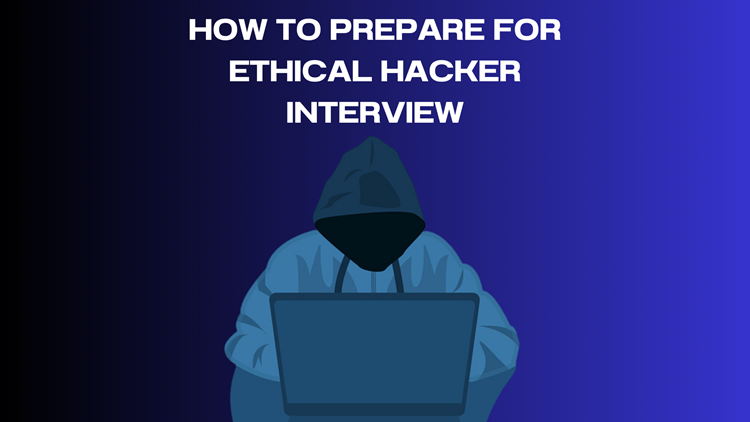You’ve come to the correct spot if you’ve started on the path to becoming an ethical hacker and are getting ready for an interview. Although working as an ethical hacker is an intriguing possibility, specific difficulties are involved. You must be well-prepared to succeed in this industry, both in terms of your knowledge and abilities from your Ethical Hacking Course and your capacity for handling difficult Ethical Hacker Interview Questions. In this blog, we will coach you through the stages to properly prepare, ensuring you stand out in your ethical hacker interview.
Table of contents
- Understanding the Ethical Hacking Course
- Preparing for Ethical Hacker Interview Questions
- Understand the Basics
- Technical Proficiency
- Vulnerability Assessment
- Penetration Testing
- Incident Response and Forensics
- Security Policies and Compliance
- Soft Skills
- Case Studies and Scenarios
- Keep Calm and Ask Questions
- Continuous Learning
- Conclusion
Understanding the Ethical Hacking Course
Having a solid foundation in ethical hacking is crucial before beginning interview preparations, which often starts with registering for an ethical hacking course. These programmes offer a well-organised curriculum that covers numerous hacking, security, and ethical hacking-related topics. How to get the most out of your ethical hacking training is as follows:
- Choose the Right Course: Choose a trustworthy ethical hacking course from a credible school or online resource. The industry is highly esteemed for credentials like Certified Ethical Hacker (CEH) or Offensive Security Certified Professional (OSCP).
- Commit to Learning: Go into the course with a sincere desire to learn and a dedicated attitude. Maintaining an open mind and being interested is essential if you want to hack ethically.
- Regular Practice: Practical experience is crucial to ethical hacking. Don’t forget to finish the laboratories, capture-the-flag (CTF) challenges, and practical exercises assigned in your course. You’ll get better the more you practise.
- Create a house Lab: Set up a lab setting at your house to test hacking and security technologies. This may be a crucial step in your learning process since it allows you to practise your abilities in a safe setting.
- Connect with Peers: To contact other students and professionals, join online discussion forums, social media groups, or regional cybersecurity events. Your learning can be strengthened by exchanging information and experiences.
- Stay updated: The discipline of ethical hacking is rapidly developing. Through blogs, news sites, and podcasts focused on cybersecurity, keep up with the most recent vulnerabilities, exploits, and security trends.
Preparing for Ethical Hacker Interview Questions
It’s time to concentrate on acing your interview now that you’ve established the basis with your ethical hacking training. Even while interviews for ethical hackers might be demanding and daunting, with the correct preparation, You have the ability to confidently answer any questions. Let’s explore methods for success:
Understand the Basics
Make sure you understand the foundations before tackling particular ethical hacker interview questions. Prepare an explanation for the following:
- Definition of Ethical Hacking: Clearly and briefly describe what ethical hacking is and the significance of it for cybersecurity.
- Legal and Ethical Framework: Recognise the ethical and legal restrictions that apply to ethical hacking. Describe the significance of getting permission before penetration testing or vulnerability assessments.
Technical Proficiency
Expect assessments of your technical proficiency and knowledge from your ethical hacking course in the following areas:
- Standard Hacking Techniques: Be prepared to talk about typical hacking methods including phishing, SQL injection, and buffer overflow attacks. Give instances and describe ways to counter them.
- Operating Systems and Networking: Understanding the various operating systems, network protocols, and their weaknesses is essential for networking. Concerning safeguarding multiple OS environments, you could be questioned.
- Tools Usage: Become acquainted with well-known hacking tools like Wireshark, Metasploit, Nmap, and Burp Suite. Describe when to utilise them and how to do so efficiently.
Vulnerability Assessment
Show that you can recognise and evaluate vulnerabilities:
- Vulnerability Scanning: Explain the procedure for vulnerability scanning and the instruments you would employ, such as Nessus or OpenVAS.
- Risk Assessment: Describe how you rank vulnerabilities according to their likelihood and possible effect. Mention elements like the business impact analysis and CVSS score.
Penetration Testing
Be prepared to discuss your expertise in penetration testing:
- Methodology: Describe your penetration testing methodology, covering the phases of reconnaissance, enumeration, exploitation, and post-exploitation.
- Reporting: Describe how you organise and present your results, emphasising conciseness and corrective suggestions.
Incident Response and Forensics
Display your expertise in digital forensics and crisis response:
Incident Handling: Discuss the procedures you would take to deal with an issue involving security. Place a focus on protecting evidence and limiting harm.
Forensic Tools: Investigate compromised systems and data breaches using forensic tools by becoming familiar with their methods.
Security Policies and Compliance
Show that you are aware of security regulations and compliance:
- Security policies: Access control, password management, and data classification are just some security rules that should be discussed.
- Compliance Guidelines: Be educated about the influence of industry-specific compliance frameworks on security practises, such as PCI DSS, HIPAA, or GDPR.
Soft Skills
Keep in mind that technical expertise is only one component of the puzzle. Strong communication and problem-solving abilities are necessary for ethical hackers:
- Communication: You may need to explain security problems to clients or management, so demonstrate your ability to convey complicated technical topics to non-technical audiences.
- Problem-Solving: Demonstrate your ability to solve problems by discussing instances in the real world where you overcame security obstacles.
Case Studies and Scenarios
Prepare for case studies and fictitious situations that test your ability to make decisions:
- Incident Response: Have a plan in place for how you would analyse an event scenario and alleviate the problem.
- Security Architecture: Discuss how you would create a secure network or system architecture for a specific business requirement. Security Architecture.
Keep Calm and Ask Questions
Maintain your composure and cool throughout the interview. Do not hesitate to seek clarification if you are unclear about a question. Asking for clarification is preferable to giving a false response.
Continuous Learning
Candidates who are dedicated to ongoing learning and professional development in their industry are frequently praised by interviewers. To show your commitment, include any upcoming courses or certifications.
Conclusion
Technical know-how, real-world experience, and strong communication skills are needed to prepare for an ethical hacker interview. The foundation for success is a strong ethical hacking course, but whether you’ll be successful in the position will ultimately depend on how well you perform in the interview. You may improve your chances of landing your desired job in the fascinating field of ethical hacking by studying the fundamentals, developing your technical abilities, and practising ethical hacker interview questions. The journey doesn’t end with the interview; keep in mind ethical hacking is a dynamic sector that needs continual study and adaptation to stay competitive. Wishing you success as you pursue a career as an ethical hacker!




